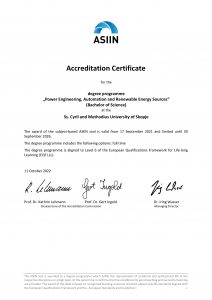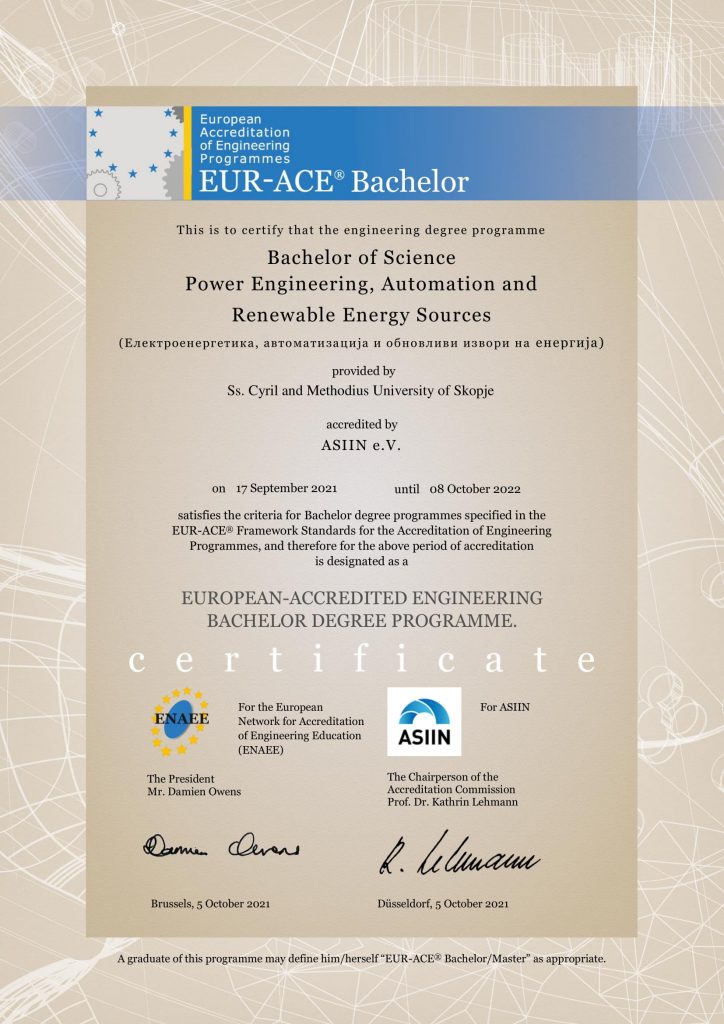ObjectivesLearning outcomesIIIIIIIVVVIVIIVIIIElective Courses
Study Programme
Power Engineering, Automation and Renewable Energy Sources
Degree Programme
First cycle degree programme
Level of qualification
Bachelor of Science in Electrical Engineering and Information Technologies, in Power Engineering, Automation and Renewable Energy
Occupational Profiles of Graduates
Graduated engineers from this profile are empowered with skills to work in power sector (power plants utilities, energy transmission and distribution) in industry, small and medium enterprises, engineering and consalting companies as well as in research and development centers and educational institutions. Graduate engineers have a unique opportunity to contribute in power sector that is the most sustainable employer since many decades. Power and Industry offer many opportunities for well paid jobs and successful carrier. Working in the field of Renewable Energy Sources offers great opportunities and chalenges for young engineers in contemporary environment. This profile of graduate electrical engineers with internationally recognized diploma, are required in engineering&consalting, public sector, power&supply companies in the country and abroad.
The Programme Learning Outcomes
The study programme provides graduated electrical engineer with high-level educated research skills and competencies for design, professional development and put into operation the power plants and devices, in entire power system (production, transmission and distribution) utilizing the principles of electro-thermical and electro-mechanical energy conversion. The further educational goals are: Variable speed and torque control of electrical drives; Design and process automatisation; Modelling analysis and design of electrical machinery and transformers by means of advanced software tools; Efficiency and reliable industry/haushold energy consumption. Electrical engineers with this profile have the chance to work with esteemed innovators, engineers, and scientists to develop economically viable and environmentally sustainable clean-energy systems that utilize renewable energy sources, with emphasis on wind, solar, and water power exploitation. Furthermore students have the opportunity to gain practical skills for investigationg RES and testing the machinery and equipment in our modern laboratory.
International Accreditation
The first cycle study programs at FEEIT are accredited by the German Accreditation Agency for Study Programmes in Engineering, Informatics, Natural Sciences and Mathematics (ASIIN), which is a world leader in quality assurance in higher education. This accreditation confirms that the study programs satisfies the criteria for Bachelor degree programs specified in EUR-ACE Framework standards for the accreditation of engineering programs and the content studied are relevant to areas covered in study programs.
General Learning Outcomes
| Knowledge and understanding |
- Demonstrate knowledge and understanding in the scientific field of electrical engineering, based on education and training, including knowledge of theoretical, practical, conceptual, comparative, and critical perspectives in the scientific field according to the appropriate methodology.
|
| Application of knowledge and understanding |
- Demonstrate the ability to apply acquired knowledge and understanding in a professional manner.
- An ability to identify, analyze and solve complex engineering problems by selecting an appropriate method.
|
| Ability to assess |
- An ability to collect, analyze, evaluate and present information, ideas, and concepts based on relevant data.
- Making an appropriate assessment taking into account personal, social, scientific and ethical aspects.
|
| Communication skills |
- An ability to communicate effectively in both verbal and written forms with professional and non-professional audiences.
- An ability to work effectively as an individual or as a member of a team taking shared responsibility for collective results.
- Ability to participate independently, in a professional manner, in regards to scientific and interdisciplinary discussions.
|
| Learning skills |
- Commitment to the professional development and lifelong learning achieved through higher education, technical training, membership in professional societies, and other activities in order to update already acquired knowledge in the relevant field to achieve continuous professional growth.
- An ability to acquire and apply new knowledge as needed using appropriate learning strategies.
|
Specific Learning Outcomes
| Knowledge and understanding |
- Demonstrate knowledge and understanding in the scientific field of electrical engineering, based on education and training, including knowledge of theoretical, practical, conceptual, comparative, and critical perspectives in the scientific field according to the appropriate methodology.
- Demonstrate knowledge and understanding of research, development, and engineering design in industrial processes and power engineering, automation and renewable energy sources.
- Understanding and knowledge of current issues related to scientific research and new sources of knowledge.
|
| Application of knowledge and understanding |
- An ability to identify, analyze and solve complex engineering problems.
- An ability to apply knowledge and understanding in a way that demonstrates professionalism to the relevant field or profession.
- An ability to identify, analyze and solve problems related to power engineering, automation and renewable energy sources.
|
| Ability to assess |
- An ability to collect, analyze, evaluate and present information, ideas and concepts from relevant data.
- Making an appropriate assessment taking into account personal, social, scientific and ethical aspects.
- An ability to provide answers to both theoretical and practical issues, in order to give explanations and choose the appropriate solution.
- An ability to analyze, evaluate and present information, ideas and concepts from relevant data in the field of power engineering, automation and renewable energy sources.
|
| Communication skills |
- An ability to communicate effectively in both verbal and written forms with professional and non-professional audiences.
- An ability to work effectively as an individual or as a member of a team taking shared responsibility for collective results.
- An ability to participate independently and professionally in specific, scientific and interdisciplinary discussions
|
| Learning skills |
- Commitment to professional development and lifelong learning through higher education, technical training, membership in professional societies, and other activities in order to update already acquired knowledge in the field and to achieve continuous professional growth.
- An ability to acquire and apply new knowledge as needed, using appropriate learning strategies.
- Demonstrate a high degree of independence initiative for learning and professional development.
- Understanding the need for learning and ability for continuous professional development, through the use of professional and scientific literature, professional training, continuing formal education, membership in professional organizations, etc.
- Awareness of new technologies and the ability to evaluate and use modern software development tools.
- An ability to use information technologies for distance and e-learning.
- Skills for cooperative, competitive and individual learning.
- Applying active teaching and learning techniques.
|
| During studying, the student may choose up to 4 courses from the faculty list of electives |
| During studying, the student may choose up to 4 courses from the faculty list of electives |
| During studying, the student may choose up to 4 courses from the faculty list of electives |
| During studying, the student may choose up to 4 courses from the faculty list of electives |





